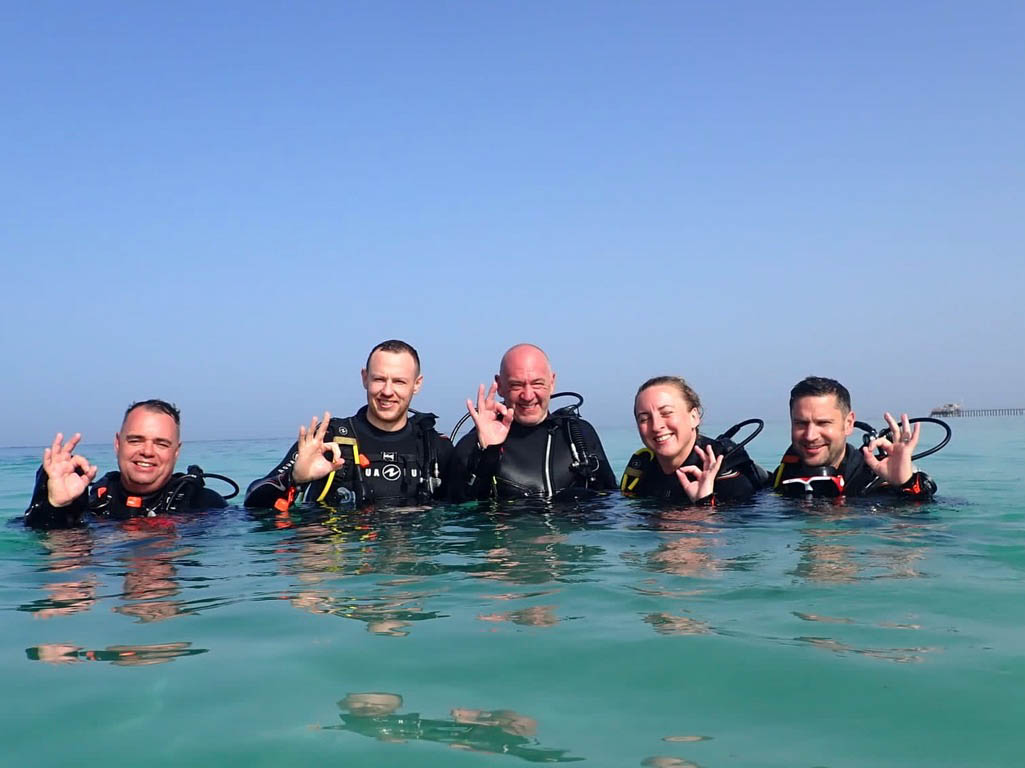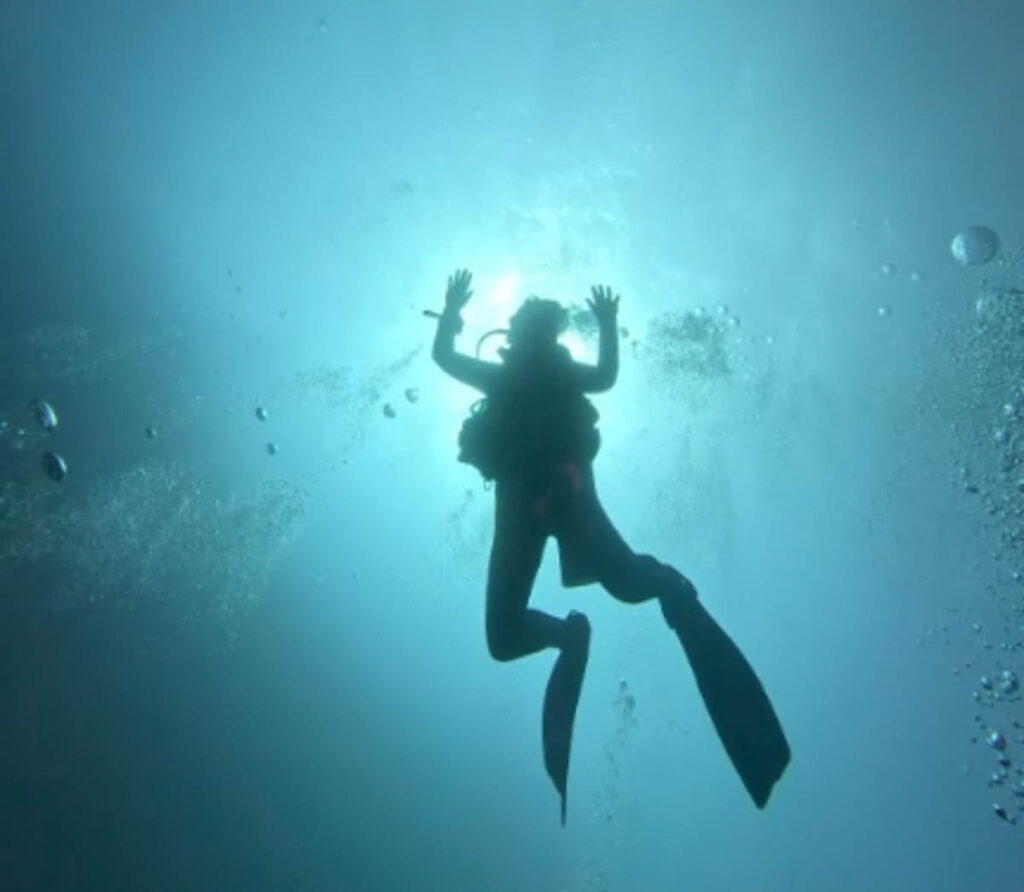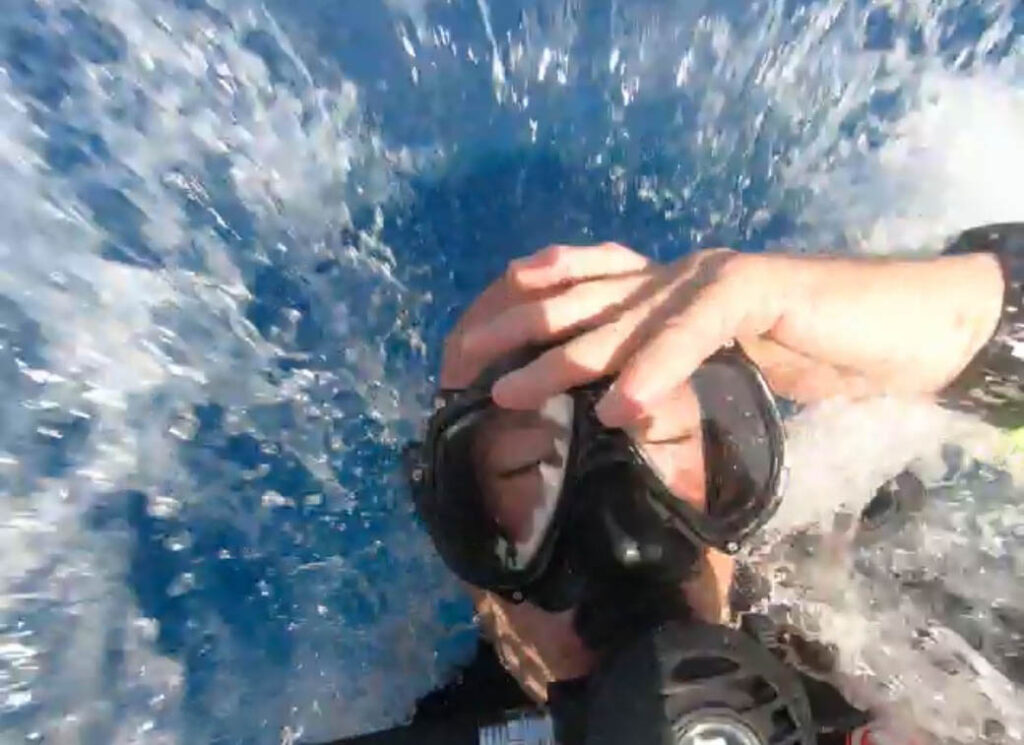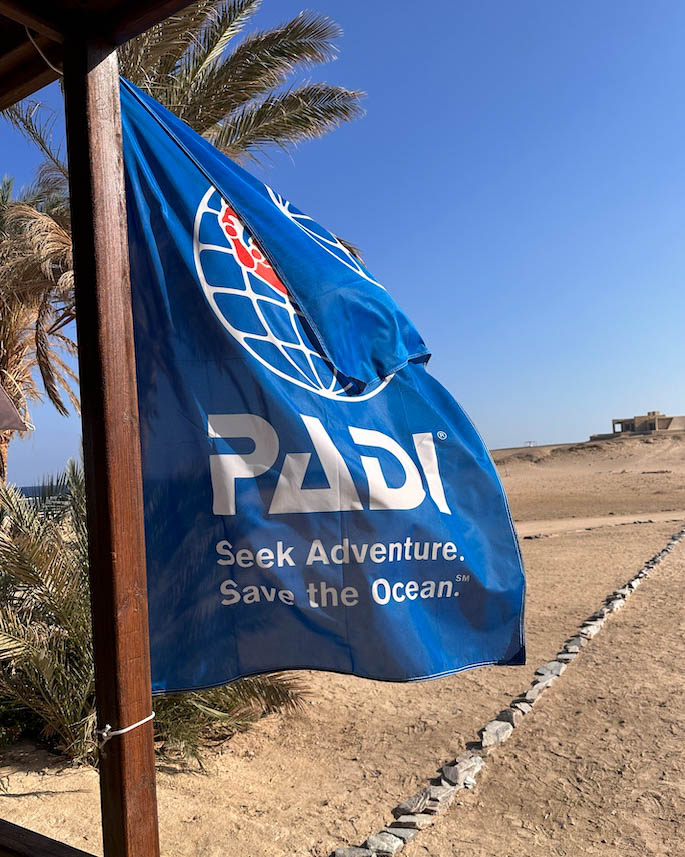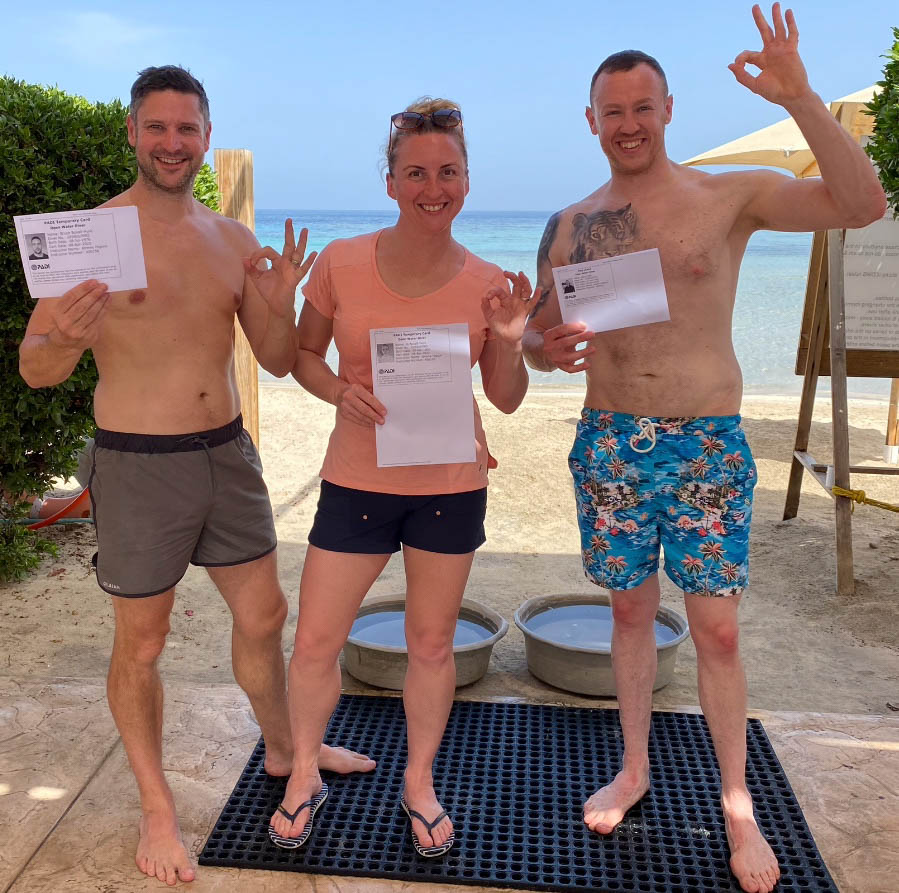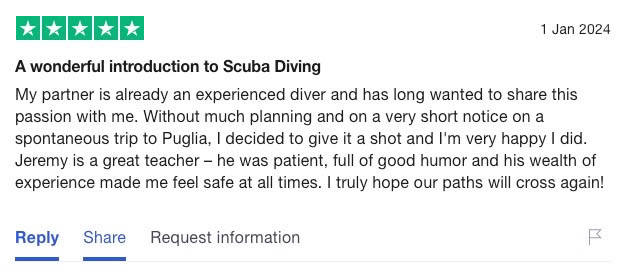Scuba diving is a wonderful way to experience the beauty and diversity of marine life, and to explore shipwrecks, caves, and other underwater features across the world.
For many scuba diving becomes a hobby & passion, but it’s also hugely popular for holidays to destinations such as Egypt, Oman, Indonesia, Thailand, Philippines and the Maldives… offering an unparalleled underwater experience for new and experienced divers.
Find out more about Scuba Diving in our getting started guide.
What is Scuba Diving
Scuba diving is where divers use a self-contained underwater breathing apparatus (SCUBA) to breathe underwater.
Essential Training
Before going scuba diving, it is important to get proper training and certification. This will ensure that you are able to dive safely and understand the risks involved.
There are various organisations that offer scuba diving certification, such as PADI, CMAS, and SSI. These organisations offer a variety of courses, from basic open water diver courses to advanced specialty courses such as deep diving, wreck diving and tech (find out more about which one to use below).
Important Equipment
When scuba diving, it is important to use proper equipment and to follow safety guidelines. This includes using a dive computer, which helps to monitor your dive time and depth, as well as a dive watch or dive planner.
It is also important to use a buoyancy control device (BCD) to help control your buoyancy underwater, and a dive regulator to control the flow of air from your tanks.
Be sensible
Scuba diving is a great way to explore the underwater world, but it is also important to remember that it is an activity that comes with risks.
Divers should be aware of their own limitations and should always dive within their own level of experience and training. It is also important to be aware of the potential dangers of diving, such as marine life, currents, and equipment failure.
Overall, scuba diving is a thrilling and rewarding activity that allows people to experience the beauty and diversity of the underwater world. With proper training and safety guidelines, it is a safe and enjoyable activity for people of all ages and abilities.
Which Agency to use
Each agency offers different courses and certifications, and each has its own unique approach to scuba diving education.
Below are three of the major agencies and we have summarised the agencies and what they offer. If you are any doubt or confused, drop us an email and we would be only too happy to discuss each of their attributes
PADI
PADI, which stands for Professional Association of Diving Instructors, is one of the most well-known and widely recognised scuba diving certification agencies in the world.
Founded in 1966, PADI has trained millions of divers and currently has more than 6,500 dive centres and resorts in over 180 countries.
One of the reasons for PADI’s popularity is its wide range of courses for divers of all levels, from beginner to professional.
The most popular PADI course is the Open Water Diver course, which teaches the basic skills and knowledge needed to safely dive in open water environments.
PADI also offers a variety of specialty courses, such as deep diving, wreck diving, and digital underwater photography, that allow divers to expand their skills and knowledge.
It also offers different types of certifications, such as the Junior Open Water Diver, which is designed for children, and the Master Scuba Diver, which is the highest non-professional certification level in PADI and recognises the diver’s experience and skills.
Another aspect that sets PADI apart from other dive agencies is the flexibility of its courses, PADI’s eLearning program allows divers to complete the knowledge development part of the Open Water Diver course online, before arriving at the dive center. This allows divers to learn at their own pace and to fit the course into their busy schedules.
PADI is also known for its commitment to safety and environmental conservation. The agency has developed a number of programs and initiatives to promote safe diving practices and to protect the underwater environment. These include Project AWARE, which focuses on ocean conservation and marine debris removal, and the PADI Diver Propulsion Vehicle (DPV) Specialty course, which teaches divers how to safely and responsibly use underwater scooters.
In conclusion, PADI is one of the most well-known and widely recognised scuba diving certification agencies in the world. With its wide range of courses, flexible eLearning program, and commitment to safety and environmental conservation, PADI is an excellent choice for anyone looking to learn to dive or to expand their diving skills and knowledge.
CMAS
CMAS, short for Confédération Mondiale des Activités Subaquatiques, is a French dive agency that offers scuba diving certifications and training.
Founded in 1959, CMAS is one of the oldest and most respected dive agencies in the world, and is recognised by the World Recreational Scuba Training Council (WRSTC) as a major training organisation.
One of the unique features of CMAS is its multi-level certification system. Unlike other dive agencies, which have a single level of certification for open water divers, CMAS has three levels of certification for open water divers: 1-star, 2-star, and 3-star. Each level represents an increasing level of skill and knowledge, and divers can progress through the levels as they gain more experience.
- The 1-star level is the entry-level certification for open water divers. It is designed for divers who are new to scuba diving and want to learn the basics of diving, such as dive theory, dive equipment, dive planning, and dive safety.
- The 2-star level is the intermediate level certification for open water divers. It is designed for divers who have completed the 1-star level and want to gain more experience and knowledge. The 2-star level covers more advanced topics such as deep diving, navigation, and emergency procedures.
- The 3-star level is the advanced level certification for open water divers. It is designed for divers who have completed the 2-star level and want to gain even more experience and knowledge. The 3-star level covers more specialised topics such as wreck diving, cave diving, and ice diving.
In addition to its open water diver certifications, CMAS also offers a wide range of specialties and instructor certifications. These include deep diving, wreck diving, cave diving, night diving, and more. CMAS also offers technical diving courses, including trimix and rebreather diving.
CMAS is also known for its strong emphasis on safety and environmental conservation. All the diving courses include instruction in dive safety and environmental awareness, and they are actively involved in ocean conservation and marine research projects around the world
SSI
Scuba Schools International (SSI) is a globally recognised scuba diving certification agency that offers a wide range of scuba diving courses and certifications.
Founded in 1970, SSI has trained millions of divers and currently has more than 40,000 dive professionals and over 2,500 dive centres and resorts worldwide.
One of the unique features of SSI is its focus on providing a comprehensive and holistic dive education program. SSI has a unique training system that is based on the concept of “Total Dive Control”. This means that SSI courses are designed to teach divers not only the basic skills of diving, but also how to fully control and manage their dive experience, from planning and preparation to execution and analysis.
SSI also offers a variety of courses for divers of all levels, from beginner to professional. The most popular SSI course is the Open Water Diver course, which teaches the basic skills and knowledge needed to safely dive in open water environments.
There are also a variety of specialty courses, such as deep diving, wreck diving, and digital underwater photography, that allow divers to expand their skills and knowledge.
SSI also offers a Master Diver program, which is the highest non-professional certification level in SSI, which recognises the diver’s experience and skills.
Another aspect that sets SSI apart from other dive agencies is its flexibility in the final open water test. SSI allows divers to take the final open water dive test in a pool, whereas PADI requires the test to be done in open water.
SSI also has a strong commitment to safety and environmental conservation. All SSI diving courses include instruction in dive safety and environmental awareness, and SSI is actively involved in ocean conservation and marine research projects around the world.
In conclusion, SSI is a globally recognised scuba diving certification agency that offers a wide range of scuba diving courses and certifications. With its comprehensive and holistic dive education program, flexible final open water test, and commitment to safety and environmental conservation, SSI is an excellent choice for anyone looking to learn to dive or to expand their diving skills and knowledge.
Course Example: PADI Open Water Course
The PADI Open Water Diver course is the most popular scuba diving certification course in the world.
It is a comprehensive course that teaches the skills and knowledge needed to safely dive in open water environments. The course is designed for people who are new to scuba diving and want to learn the basics of diving, as well as for those who want to refresh their skills and knowledge.
The PADI Open Water Diver course is divided into three main parts: knowledge development, confined water dives, and open water dives.
Knowledge development
The knowledge development part of the course is usually done through a combination of independent study, such as reading the PADI Open Water Diver manual, and classroom sessions with an instructor. The topics covered in the knowledge development part of the course include dive theory, dive equipment, dive planning, and dive safety.
Confined water dives
The confined water dives are the pool or pool-like sessions where you will learn the basic skills of diving such as clearing the water from the mask, regulator recovery, and control of buoyancy.
Open water dives
The open water dives are where you will put the skills you learned in the confined water dives into practice.
You will usually complete four open water dives, which will take place in a natural body of water such as a lake or ocean. During these dives, you will explore the underwater environment and practice the skills you learned in the confined water dives.
Great way to learn the basics & get certified
The PADI Open Water Diver course is a great way to learn the basics of scuba diving and to gain the skills and knowledge needed to safely dive in open water environments.
Upon successful completion of the course, you will be certified as a PADI Open Water Diver and will be able to dive to a maximum depth of 60 feet.
The certification is recognized worldwide and you can continue your diving education with PADI by taking the advanced open water course and other specialties.
Overall, the PADI Open Water Diver course is a great way to get started in the exciting world of scuba diving. With proper training, you can safely explore the underwater world and experience the beauty and diversity of marine life.
If you would like more information or discuss a course in more detail, contact My Sea to Sky. Our experienced diving team can talk you through all the aspects of the PADI and SSI courses we run on a regular basis.
Or, why not combine your diving training with a holiday in some amazing locations that are suited to your level of experience, just ask we are only too happy to recommend the prefect diving location for you
We are a full service tour operator offering nature immersive and wellness experiences tailored to our discerning adventurers, looking for active escapes to undiscovered gems.



